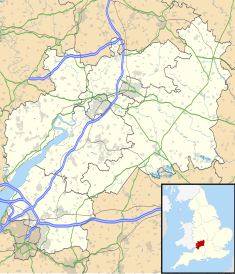Thornbury Town Hall
| Thornbury Town Hall | |
|---|---|
 Thornbury Town Hall | |
| Location | High Street, Thornbury |
| Coordinates | 51°36′28″N 2°31′33″W / 51.6077°N 2.5259°WCoordinates: 51°36′28″N 2°31′33″W / 51.6077°N 2.5259°W |
| Built | 1785 |
| Architectural style(s) | Neoclassical style |
Listed Building – Grade II | |
| Official name | Magistrates Court |
| Designated | 4 September 1973 |
| Reference no. | 1128795 |
 Shown in Gloucestershire | |
Thornbury Town Hall, is a municipal building in the High Street, Thornbury, Gloucestershire, England. The building, which is the meeting place of Thornbury Town Council, is a Grade II listed building.[1]
History[]
The first building on the site on the east side of the High Street between Silver Street and Soapers Lane was a public house known as the "Wine Tavern" which dated back at least to 1590.[2] It was acquired by an apothecary, John Gayner, who converted it for his own use in 1737.[2] The site was then acquired by an attorney, George Rolph, who decided to demolish the original building and commission the current structure.[2]
The new building was designed in the neoclassical style, built in brick with a stucco finish and was completed in 1785.[3] The design involved a symmetrical main frontage with three bays facing onto the High Street; the central bay featured a portico with Ionic order columns supporting an entablature. The outer bays were fenestrated by tri-partite sash windows and, at roof level, there was a modillioned cornice and a parapet. Internally, the principal room was a large drawing room at the front of the building on the first floor.[3] Following George Rolph's death in 1815, the house passed to his son, William,[4] who enlarged the property by incorporating two other properties at the rear.[3]
Following William Rolph's death in 1848, the building was auctioned and acquired by the local justices of the peace.[3] They commissioned a local contractor, Daniel Burchell, to convert the building into a police station and courthouse.[3] Accommodation for the police sergeant and constables was created at the rear of the building. The drawing room was converted into a courtroom, which opened in time for the quarter sessions in March 1860.[3][5] A large circular plaster cast recording the new use of the building and the date of the conversion was installed on the front of the building at first floor level.[6]
Thornbury Rural District Council, which was established in 1894,[7] was not involved in the operation of the courthouse and instead established itself in council offices in Castle Street.[8] The building in the High Street continued to operate as a police station until 1973, when a new police station opened in Rock Street, and continued to host magistrates court hearings until 1986, when the magistrates moved to a modern courthouse in Yate.[3][9] The building then remained empty and deteriorating until it was acquired by Thornbury Town Council in April 1992. Restoration works, which involved the conversion of the courtroom into a council chamber, were completed in 1994.[3] The old custody cells in the police station were restored for use as a visitor attraction[10] and a tourist information centre was established on the ground floor of the building.[11]
References[]
- ^ Historic England. "Magistrates Court (1128795)". National Heritage List for England. Retrieved 19 January 2022.
- ^ a b c "The Tavern, 35 High Street". Thornbury Roots. Retrieved 19 January 2022.
- ^ a b c d e f g h "The Town Hall, 35 High Street". Thornbury Roots. Retrieved 19 January 2022.
- ^ "Will of George Rolph, Gentleman of Thornbury, Gloucestershire". National Archives. Retrieved 19 January 2022.
- ^ Cerry, Tony; Wise, Meg (2015). Thornbury Through Time. Amberley Publishing. ISBN 978-1445652481.
- ^ Verey, David; Brooks, Alan (2002). Gloucestershire (Buildings of England Series). Vol. 2. Yale University Press. p. 757. ISBN 978-0300097337.
- ^ "Thornbury RD". Vision of Britain. Retrieved 19 January 2022.
- ^ "No. 42190". The London Gazette. 11 November 1960. p. 7667.
- ^ "Demolition of Yate's courthouse gets the go-ahead". The Gazette. 31 March 2018. Retrieved 19 January 2022.
- ^ "Town Hall". Thornbury Town Council. Retrieved 19 January 2022.
- ^ "Thornbury Tourist Information Centre". My Thornbury. Retrieved 19 January 2022.
- Government buildings completed in 1785
- City and town halls in Gloucestershire
- Grade II listed buildings in Gloucestershire
- Thornbury, Gloucestershire